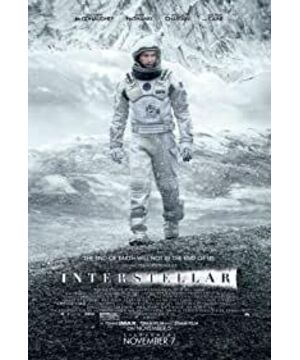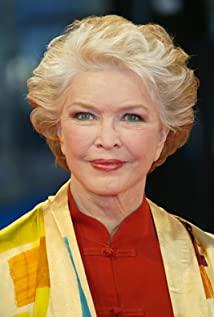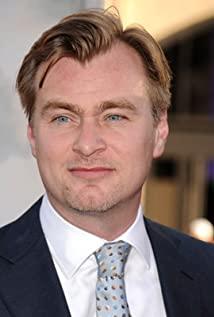The director of the liberal arts is using a slightly dull film language to construct a depressing doomsday for the audience. That kind of despair does not seem to be absolute, nor is it strong, but gradually fills up in the twilight of the sky in the slow passage of time, just like the last suffocation predicted by old Dr. Brand. And the first step of this kind of despair is to lose the ability to "look up at the stars", to lose the vision and imagination beyond the material world within reach. Well, in a world where even professional baseball players don't exist, it's probably the same desert of humanity.
Even as everyone touted its "hard sci-fi" realism, most expressed disappointment at the film's so-called "core", criticizing the emotional "core" for being cliché and lacking depth. More than once I heard people around me say "I just want to see the end of the world and the big scenes, why are there so many sensationalities." But in my opinion, behind the so-called sensationalism, what the movie is really discussing is: in such despair, What should human beings rely on? What ultimate ideal needs to be cherished? Is there any divinity in a world where God is dead? Facing the mortal fate that may happen and will happen, is there still the possibility of transcending death?
In fact, these seemingly philosophical topics are always appearing in science fiction or doomsday movies, and they are not too new. However, what Nolan gave in this movie was really just a simplified and cliché answer like "love can save the world"?
A film reviewer said, "This film has no depth, because it does not build a grand enough world view and cosmology when predicting the fate of mankind as a whole, but sticks to the personal feelings of some sons and daughters. It seems very reasonable, think about it carefully, but It is rather ironic, because what this misreading advocates is actually what Nolan wants to disintegrate and criticize in this film. Does this film really not talk about the "destiny of mankind as a whole" and "grand world cosmology"? The best actor, the queen and the two poor cannon fodder set off to travel in space with such a grand ambition: at first, whether it was plan A or plan B, the purpose was to save the fate of the entire human race. They positioned divinity and hope in mystery of outer space, with hopes of redemption behind that enchanting wormhole. But in the end? Trust in utility, theory and reason was shaken after the defeat of the first planet, and completely collapsed after the blackening of Dr. Mann Isn't Dr.
Mann the one who originally proposed "We have to sacrifice ourselves to save mankind"? Isn't he exactly what many sci-fi fans expect, the hero who cares about "the fate of mankind as a whole" and the "grand view of the universe"? In this way, Mann is representing an old-fashioned failed heroic dream. Many people accuse him of inexplicable blackening, which in my opinion is the core criticism of the whole film. Like "Save all mankind, The grand narrative and metaphysical ideal (completely like communism) of "continuing human culture" eventually collapsed into hypocrisy and nothingness in the face of human selfishness. When Mann recited "we must consider the future of all mankind", On the one hand, cowards are generally bombed into cosmic dust when they try to hide in the Perpetuity. Isn't this irony enough to show that it is those so-called "grand world views (under collectivism) that are most worthy of reflection and criticism?"
But this film clearly does not belong to the category of pure skepticism and nihilism. After ridiculing the grand ideal of human beings, it gives a seemingly trivial answer, but it is also an extremely "Nolan" answer. "Interstellar" (or finally a Hong Kong translation seems to be more accurate: "Interstellar Apocalypse") is nothing but Nolan's use of the stage of relativity to demonstrate his belief in the subjective existence and subjective emotions of human beings. Rather than saying that the theme is "love can save the world" that sounds vulgar and general, it is still "Memory matters. One's memory can change one's future" that has always been reflected in Nolan's films. In his films, memory has always seemed to be the most mysterious and powerful ability of man. The ability to remember is the vicious circle that Reiner desperately seizes in "Memory Fragments", but also seems to be trying to escape, but is ultimately unable to escape. In this film, our own memory, and the memory we leave to others, finally become a kind of faith, a place of divinity, a kind of salvation that, like gravity, can transcend the dimension of time and space.
Why do I think so? If we take the actor falling into a black hole as a metaphor for falling into death, because human beings know nothing about the world of black holes just like the world behind death, and they also pass through the "horizon" and never come back. , then he would fall into the back of the bookcase in his daughter's room, it doesn't seem difficult to understand. The foreshadowing of the death metaphor in the first part of the movie is also rich enough. The daughter calls the mysterious power behind the bookcase "ghost", and "ghost" is the phantom left by people in the world after death. Before leaving, the actor also comforted his daughter and said, "Every parent eventually becomes a child's ghost." The plan to save the earth called "Lazarus" means "reborn from death". Even when Anne Hathaway and the actor argued about the meaning of love, the actor rationally and utilitarianly argued that because love can have social effects, the goddess retorted: "Then why do we still love people who have died?"
A dead man, or a man like Cooper's father adrift in the infinite universe, the only traces of him on earth are his memories of others. In the end, Dad delivered a message that could redeem everything, and it was also realized through a watch that he gave his daughter as a souvenir. But perhaps the most symbolic is the cabinet of books. Books are memories that are solidified on entities that can survive for a long time. As the traces of a deceased person's thinking, books are used as carriers to replace the human body that will eventually be disillusioned and continue to exist in the world. In such an apocalyptic era where engineers are no longer valuable, the protagonist still retains such a cabinet of books, clinging to the memories of those who are long gone and preserved by language - and we usually refer to such memories of all human beings called culture. Then the so-called human memory emphasized and admired by Nolan may not only be personal emotion and love, but also full of belief in the wisdom and knowledge accumulated by human beings in the past. That is to say, our divinity in the face of death lies in our subjective emotions that are difficult to be explained by utilitarianism and rationality (let the lover remember it), and the spirit of forever exploring the unknown and thinking about the unknown (let history remember).
Finally, in refuting Heidegger's existential discourse on time, Paul Ricoer pointed out that the narrative of human subjective experience, that is, our ability to remember events, extends time beyond the life that human beings can experience. Nolan said in the huge background of doomsday science fiction: this ability transcends all darkness.
Two follow-up points of understanding:
1. I don’t know if Director Nolan designed the key of the doomsday story as a cabinet of books out of the sadness and feelings of the literary youth, but he is completely obsessed with the nonlinearity of time. We have long known it from playing with the narrative structure in his memory fragments, or reconstructing the subconscious in Inception. In his films, time is never something that can be measured second by second on an eternal, objective scale by a cold mechanical clock. For his films, the meaning of time comes from human existence and human subjective experience (similar to existential philosophy?), so it is often interrupted, repeated, extended, and hidden.
When the plot progressed to the point where they were about to land on the first planet close to the black hole and counted how many years each minute on it was equivalent to years on Earth, I was thinking: Isn't this Inception in reverse? It's just that one layer goes deep into people's subconscious, and the other explores the outer space of Miaoyuan, both of which are adventures aimed at human nature and breaking the structure of time in the unknown.
2. This seemingly happy ending is the only thing I feel uncomfortable and stereotyped about. The actor not only survives, but also grows and becomes more handsome. This feels not only scientifically unscientific, but also unscientific in narrative. However, fortunately, we didn't see the actor and the goddess hugging together at the end, or even when the actor got old, he told stories to his descendants on a planet in outer space (cloud map stalk...). But I reluctantly explained to myself that the story needs the male protagonist to come back to life to see that new world. After all, the space station where he woke up is very interesting.
What does the future look like? A complete simulacrum of Earth, a true simulacrum. This kind of romantic nostalgia for the earth, like the ancient Egyptian palace built in Las Vegas, has no real basis and direction for culture. Human activity space has become so three-dimensional, but history has been infinitely flattened, and it has become a documentary that is repeatedly played on TV, which can only provide people with unreal nostalgia for the past. In addition to the fact that Nolan is really obsessed with the idea that the earth grows to the sky, because the dream world built by the little girl ellen page in the Inception space also exists, I personally feel that it also seems to project a postmodern concept of reality and peace. False anxiety. This naturally implies a bit of ridicule in addition to the joy of the male protagonist being able to survive.
In this way, there may be another pessimistic interpretation of this happy ending: maybe the real world has already disappeared in the constant replication anyway.
View more about Interstellar reviews











